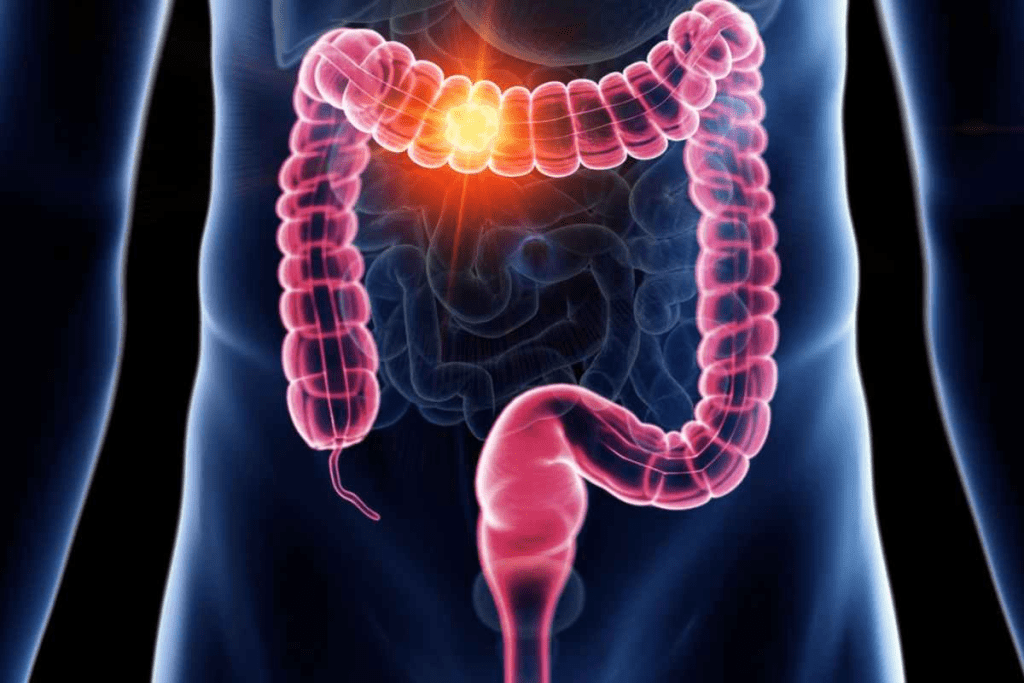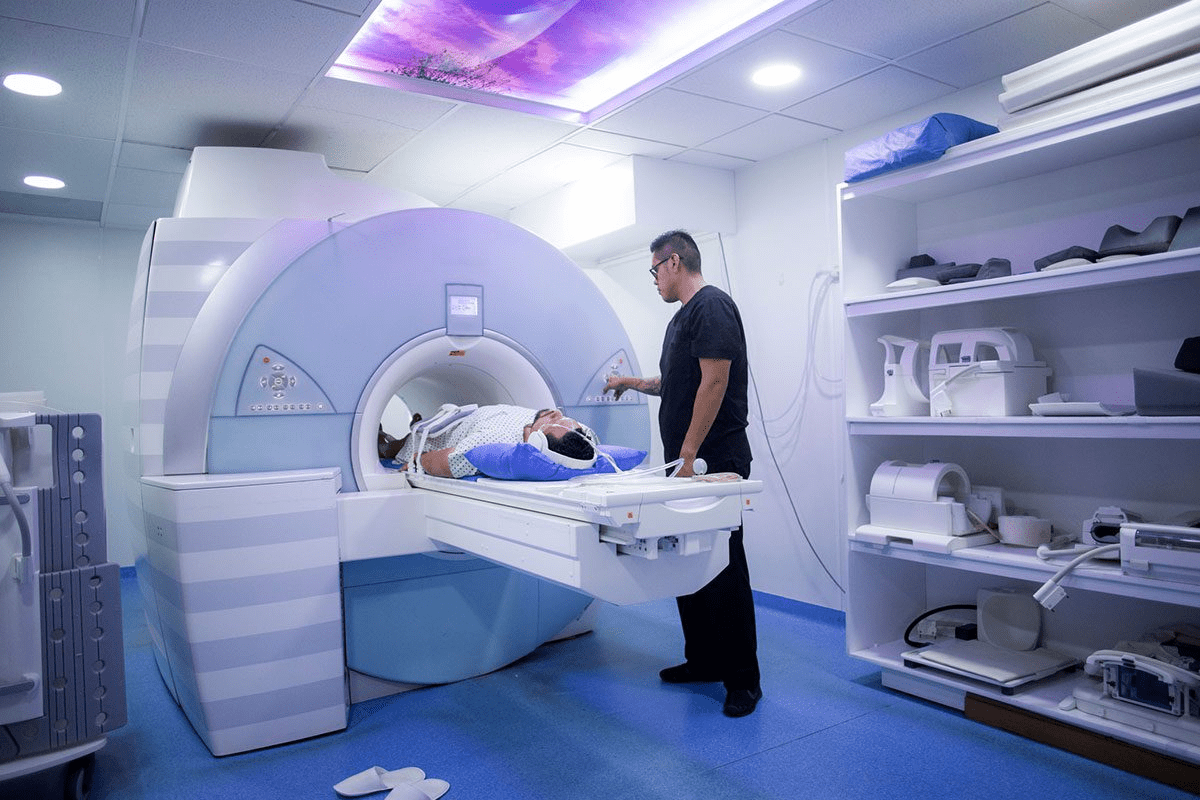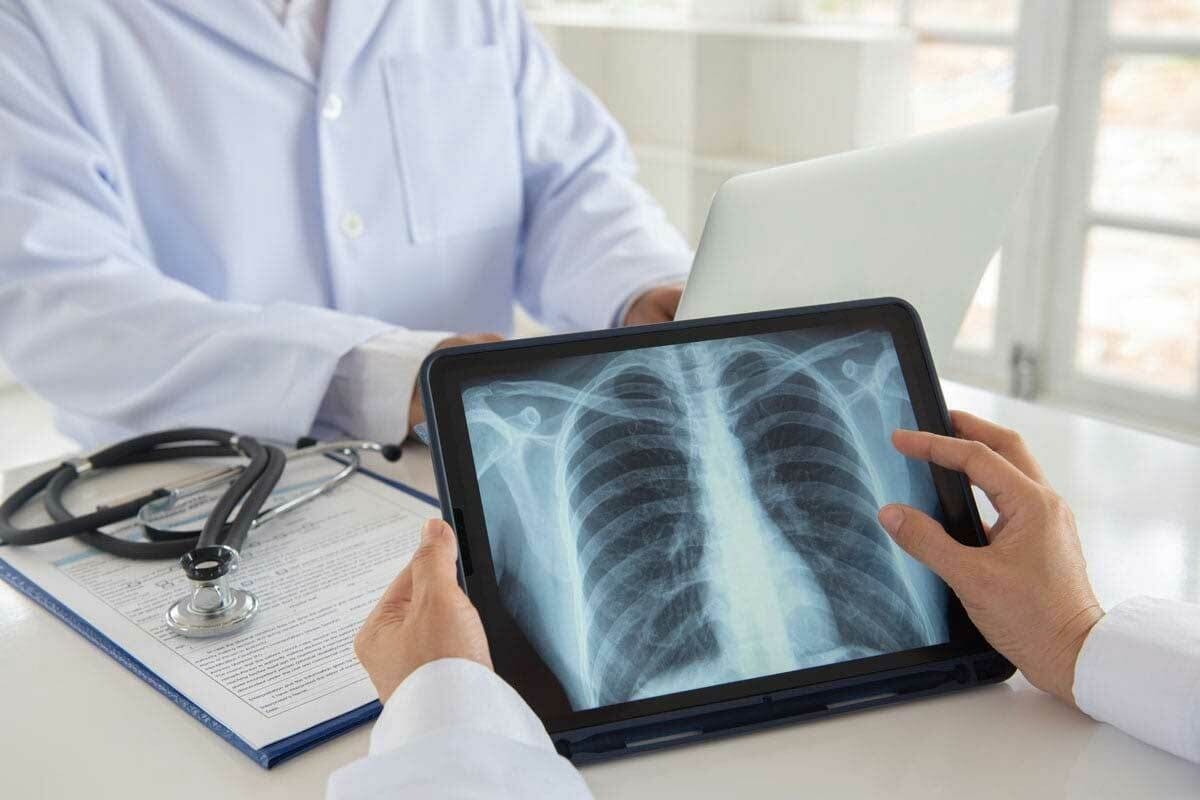Last Updated on November 26, 2025 by Bilal Hasdemir

Did you know that nearly 50% of patients getting cancer treatment face bowel changes, like diarrhea? This side effect can cause dehydration, imbalance of electrolytes, and lower quality of life. Uncover which cancer is often referred to as the Silent killer cancer due to its subtle early symptoms.
Diarrhea is a major concern for many people undergoing cancer treatment. Knowing what it looks like is key to managing it. We’ll look into cancer diarrhea symptoms and what they mean for patients.
Key Takeaways
- Diarrhea is a common side effect of cancer treatment.
- Cancer-related bowel changes can significantly impact a patient’s quality of life.
- Understanding the characteristics of cancer diarrhea is key to its management.
- Effective treatment of diarrhea can improve patient outcomes.
- Patients should be aware of the signs and symptoms to seek timely medical help.
Understanding the Connection Between Cancer and Diarrhea

It’s important to know how cancer and diarrhea are linked for better care. Cancer and its treatments can really mess with our digestive system. This can lead to symptoms like diarrhea.
How Cancer Affects the Digestive System
Cancer can mess with our digestive system in different ways. For example, tumors in the gut can block or inflame it. Cancer treatments like chemo and radiation can also hurt the intestines, causing diarrhea.
The body’s reaction to cancer is complex. It involves the tumor, our immune system, and how our body works. This complex mix can cause symptoms that range from mild to severe.
Prevalence of Diarrhea in Cancer Patients
Diarrhea is a big problem for many cancer patients, but it’s most common in those getting treatment. Research shows many patients getting chemo or radiation in the belly get diarrhea.
| Cancer Type | Prevalence of Diarrhea |
| Colorectal Cancer | High |
| Pancreatic Cancer | Moderate to High |
| Other Cancers | Variable |
Managing diarrhea in cancer patients needs a full plan. This includes medicine, changing what we eat, and support. Knowing why diarrhea happens in cancer patients helps doctors give better care.
Cancer Diarrhea Symptoms: Key Characteristics to Recognize

It’s important to know the signs of cancer diarrhea early. This can help in early detection and treatment. We will look at the main signs of cancer-related diarrhea.
Frequency and Consistency Changes
Cancer diarrhea can change how often and what your stools look like. You might notice:
- More frequent bowel movements
- Stools that are watery or loose
- Urgency and feeling like you didn’t finish
These changes can keep happening and get worse if not treated.
Duration and Persistence Patterns
How long and how often you have diarrhea matters. Cancer diarrhea can:
- Last more than a few days
- Keep going with little relief
- Be with other symptoms like weight loss
Watching these patterns closely and getting medical help if they don’t go away is key.
Associated Discomfort and Pain
Cancer diarrhea often brings discomfort and pain. You might feel:
- Abdominal cramps and tenderness
- Bloating and gas
- Pain when you have a bowel movement
These symptoms can really affect your life. Getting help quickly is very important.
Visual Characteristics of Cancer-Related Diarrhea
It’s important to know what cancer-related diarrhea looks like. This knowledge helps in early detection and treatment. Diarrhea linked to cancer can show up in different ways, so it’s key to spot these signs.
Color Variations and What They Mean
The color of your stool can tell you a lot. Normal stool color ranges from light to dark brown. But, cancer-related diarrhea might look different.
- Black or tarry stools could mean bleeding in the upper GI tract, linked to some cancers.
- Green diarrhea might show a fast move through the intestines or bile presence.
- Yellow or clay-colored stools could point to pancreas or bile duct issues.
Presence of Blood, Mucus, or Unusual Substances
Blood, mucus, or other odd stuff in your stool is a big warning. Bloody diarrhea needs quick medical check-up. It might show a tumor or lesion in the GI tract.
“The presence of blood in stool is always abnormal and should be investigated promptly.” – Medical Expert
- Mucus in stool can mean inflammation or irritation in the colon or rectum.
- Unusual substances or undigested food might show malabsorption or digestive problems.
Consistency and Texture Changes
Cancer-related diarrhea can also change how it looks and feels. Watery diarrhea is common, but other changes can happen too.
- Diarrhea with a fatty or oily look might mean fat malabsorption.
- Diarrhea with undigested food particles could point to digestion or absorption issues.
Spotting these visual signs can help both patients and doctors find cancer issues early. If your stool looks or feels off, see a doctor right away for a check-up and diagnosis.
Distinguishing Cancer Diarrhea from Other Causes
It’s important to know the difference between cancer diarrhea and other types of diarrhea. This helps doctors diagnose and treat the right cause. Diarrhea can have many causes, and finding the root cause is key to better health.
Cancer Diarrhea vs. IBS Diarrhea
Irritable Bowel Syndrome (IBS) often causes chronic diarrhea and stomach pain. IBS diarrhea doesn’t usually have blood or mucus. It also comes with bloating and gas. Cancer diarrhea, though, can have blood or unusual stuff and is often worse and lasts longer.
| Characteristics | Cancer Diarrhea | IBS Diarrhea |
| Blood or Mucus | May be present | Typically absent |
| Persistence | Often persistent and severe | Can be intermittent |
| Associated Symptoms | Weight loss, fatigue | Bloating, gas, abdominal pain |
Cancer Diarrhea vs. Infection-Related Diarrhea
Infection-related diarrhea comes from viruses or bacteria. It can be short-term or long-lasting. But, cancer diarrhea is a long-term symptom that needs ongoing care. Finding the cause of diarrhea is key to the right treatment.
“Accurate diagnosis is key to effective treatment. Understanding the differences between cancer diarrhea and other types of diarrhea can help healthcare providers develop targeted treatment plans.”
Cancer Diarrhea vs. Food Intolerance
Food intolerance can lead to diarrhea and stomach pain. It’s usually linked to certain foods and goes away when you avoid them. But, cancer diarrhea isn’t about food and keeps coming back, needing medical help.
In summary, knowing the signs of cancer diarrhea is vital. Doctors can then create the best treatment plans. This helps patients get better faster.
Specific Types of Cancer Associated with Diarrhea
Diarrhea can signal several cancers, like colorectal, pancreatic, and neuroendocrine tumors. Knowing how these cancers cause diarrhea is key for early detection and treatment.
Colorectal Cancer and Bowel Changes
Colorectal cancer can mess with bowel habits, leading to diarrhea. Tumors in the colon or rectum can change stool consistency, frequency, and even add blood or mucus. People with this cancer might notice:
- Persistent diarrhea or constipation
- Blood in the stool or black, tarry stools
- Narrowing of the stool or feeling of incomplete evacuation
Table: Common Bowel Changes in Colorectal Cancer
| Symptom | Description |
| Diarrhea | Frequent, loose stools |
| Blood in Stool | Visible blood or black, tarry stools |
| Narrowing of Stool | Pencil-thin stools or feeling of incomplete evacuation |
Pancreatic Cancer and Digestive Symptoms
Pancreatic cancer can lead to diarrhea because it affects digestive enzymes and bile ducts. Symptoms include:
- Diarrhea or steatorrhea (fatty stools)
- Weight loss and malnutrition
- Abdominal pain radiating to the back
Diarrhea from pancreatic cancer is hard to manage because it leads to poor nutrient absorption.
Neuroendocrine Tumors and Carcinoid Syndrome
Neuroendocrine tumors (NETs) can cause carcinoid syndrome when they spread to the liver. Diarrhea is a key symptom, often with:
- Flushing of the skin
- Wheezing or shortness of breath
- Heart valve abnormalities
Knowing which cancers can cause diarrhea helps both patients and doctors spot problems early. This leads to better treatment plans.
Ovarian and Gynecological Cancers: Diarrhea Presentation
It’s important to know how ovarian and gynecological cancers can cause diarrhea. These cancers can show different symptoms, and diarrhea is one of them. Spotting these signs early is key to getting the right treatment.
Early Warning Signs in Ovarian Cancer
Ovarian cancer can be hard to spot early because its symptoms are not specific. But, changes in bowel habits like diarrhea can be a sign. Diarrhea from ovarian cancer often lasts a long time and may come with bloating and stomach pain.
Distinguishing Features from Other Digestive Issues
Telling if diarrhea is from ovarian cancer or another issue can be tricky. Diarrhea from ovarian cancer usually doesn’t go away and can make you feel tired and lose weight. Seeing blood or mucus in your stool is a big sign that you need to see a doctor.
| Symptom | Ovarian Cancer Related Diarrhea | Other Causes of Diarrhea |
| Persistence | Often persistent | Variable duration |
| Associated Symptoms | Bloating, abdominal pain, weight loss | May include abdominal cramps, fever |
| Blood or Mucus | May be present | Rarely present in infectious diarrhea |
If you have diarrhea that lasts or is very bad, see your doctor. Catching ovarian and gynecological cancers early is key to treating them well.
Chemotherapy and Radiation-Induced Diarrhea
Cancer patients often get diarrhea from chemotherapy or radiation. This can really hurt their quality of life and health.
Mechanisms of Treatment-Related Diarrhea
Chemotherapy can damage the intestines, upsetting the digestive system. Radiation to the belly can cause bowel inflammation and irritation, leading to diarrhea.
Key factors contributing to treatment-related diarrhea include:
- The type and dose of chemotherapy drugs
- The area of the body treated with radiation
- The total dose of radiation received
- Individual patient sensitivity and overall health
Timing and Duration After Treatment
Diarrhea can start during or right after treatment. How long it lasts varies, from a few days to months.
Knowing when and how long diarrhea lasts helps plan better management.
| Treatment Type | Typical Onset | Average Duration |
| Chemotherapy | During or shortly after treatment | Several days to weeks |
| Radiation Therapy | During or after treatment, potentially delayed | Weeks to months |
Severity Levels and When to Seek Help
Diarrhea can be mild or severe. If you have very bad diarrhea, signs of dehydration, or bloody stools, get help fast.
Severity levels are typically categorized as follows:
- Mild: Slightly increased frequency of stools
- Moderate: More frequent stools with some urgency
- Severe: Very frequent stools with significant urgency and possible dehydration
It’s important to manage diarrhea well to avoid problems and improve life quality.
Warning Signs That Diarrhea May Indicate Cancer
Diarrhea now and then is normal. But, if it keeps happening, it might mean something serious like cancer. It’s important to know when diarrhea is just a normal thing and when it’s a sign of something more.
Unexplained Weight Loss with Diarrhea
Unexplained weight loss with diarrhea is a big warning sign. If you’re losing weight and having diarrhea a lot, your body might not be getting the nutrients it needs. This can be a sign of certain cancers.
Cancers like colorectal cancer can mess with your bowel movements and make you lose weight. If you’re losing weight without trying and have diarrhea, see a doctor right away.
Persistent Fatigue and Weakness
Fatigue and weakness can mean many things, including cancer. Diarrhea can make you feel tired because it can lead to dehydration and imbalance of salts in your body. If you’re always tired and have diarrhea, it’s a sign you need to see a doctor.
- Diarrhea that lasts for more than a few days
- Severe fatigue that interferes with daily activities
- Signs of dehydration, such as excessive thirst or dark urine
Abdominal Pain and Bloating Patterns
Abdominal pain and bloating with diarrhea could mean something serious. Cancers like ovarian cancer can cause these symptoms. Watch for any changes in your belly pain and bloating, as they can be signs of a problem.
If you notice persistent bloating, belly pain, and changes in bowel habits, talk to your doctor.
Red Flags That Require Immediate Medical Attention
Some symptoms need you to see a doctor right away. If you notice any of these, get help fast:
- Blood in your stool or black, tarry stools
- Severe abdominal pain
- Signs of dehydration
- Unexplained weight loss
- Fatigue that doesn’t improve with rest
It’s key to know these warning signs and get medical help quickly. Early detection can greatly improve treatment options for cancer.
Diagnostic Process for Cancer-Related Diarrhea
Healthcare providers use many tools to diagnose diarrhea in cancer patients. They look for the cause, which could be the cancer or a treatment side effect.
Medical Tests and Procedures
Several tests and procedures are key in finding the cause of diarrhea in cancer patients. These include:
- Stool Tests: To check for infections or blood in the stool.
- Endoscopy: A procedure to visually examine the inside of the colon.
- Imaging Tests: Such as CT scans or MRI to assess the extent of cancer and its impact on the digestive system.
- Blood Tests: To evaluate electrolyte levels, liver function, and other indicators of health.
What to Tell Your Doctor About Your Symptoms
It’s important for patients to share all details about their symptoms with their healthcare providers. This includes:
- Describing the Diarrhea: Frequency, consistency, and any changes observed.
- Associated Symptoms: Such as abdominal pain, fever, or weight loss.
- Medical History: Including any previous gastrointestinal issues or cancer treatments.
- Lifestyle Factors: Dietary habits, hydration levels, and any stress factors.
Getting an accurate diagnosis is key for effective treatment. The image below shows the diagnostic process:
Managing and Treating Cancer-Related Diarrhea
Managing cancer-related diarrhea is key to better life quality for those with cancer. It involves medical treatments, diet changes, and staying hydrated.
Medical Interventions and Medications
Medical treatments are vital in managing diarrhea linked to cancer. Antidiarrheal medications like loperamide help slow bowel movements. Octreotide is used for severe cases or with certain tumors.
It’s important for patients to talk to their doctors about the right medication and dosage. Keeping an eye on symptoms and adjusting treatments is essential.
Dietary Modifications That Help
Changing what you eat can help manage diarrhea. A low-fiber diet is often suggested to ease digestive tract irritation. Avoiding spicy or fatty foods is also advised.
Eating foods like bananas, rice, applesauce, and toast (BRAT diet) can help. Drinking clear liquids and electrolyte-rich drinks is also key.
Hydration and Electrolyte Replacement
Staying hydrated is critical in managing diarrhea. Drinking lots of fluids helps replace lost water and electrolytes. Oral rehydration solutions are great for keeping electrolyte levels balanced.
If diarrhea is very bad or lasts a long time, doctors might suggest intravenous fluids. Watch for dehydration signs like too much thirst, dark urine, or feeling dizzy. Seek medical help if you notice these.
Combining medical treatments, diet changes, and staying hydrated can help manage diarrhea. This improves life quality during cancer treatment.
Impact of Cancer Diarrhea on Quality of Life
Diarrhea linked to cancer and its treatment deeply affects a patient’s life. This symptom can cause physical and emotional challenges. It impacts daily activities and overall well-being.
Physical and Emotional Effects
Cancer diarrhea brings physical discomfort like abdominal pain and urgent bowel movements. These can lead to fatigue, dehydration, and imbalances in electrolytes. Emotionally, patients may feel anxious, stressed, and isolated.
The emotional impact of cancer diarrhea is significant. Patients often feel embarrassed or ashamed, leading to social withdrawal. Healthcare providers must address these feelings with empathy and understanding.
Strategies for Coping with Chronic Symptoms
Managing cancer diarrhea requires a team effort. Patients should work with their healthcare team to create a personalized plan. This might include dietary changes or avoiding certain foods.
Medications are also key in managing diarrhea. We may prescribe antidiarrheal drugs or other treatments. Staying hydrated and keeping electrolyte levels balanced are also vital to prevent complications.
Emotional support is just as important. We encourage patients to reach out to family, friends, or support groups. By tackling both physical and emotional challenges, we can enhance patients’ quality of life.
Preventive Measures and Risk Reduction
To prevent cancer diarrhea, we need to make lifestyle changes and manage treatment well. Knowing what causes diarrhea in cancer patients helps us lessen its effects.
Lifestyle Factors That May Help
Making some lifestyle changes can lower the risk of diarrhea during cancer treatment. These include eating differently, drinking lots of water, and managing stress.
- Dietary Changes: Eating less spicy, fatty, or high-fiber foods can ease digestive issues. A bland diet like bananas, rice, applesauce, and toast (BRAT diet) is helpful.
- Hydration: Drinking lots of fluids is key to avoid dehydration from diarrhea. Electrolyte-rich drinks like coconut water or sports drinks replace lost salts.
- Stress Management: Stress-reducing activities like meditation, yoga, or deep breathing can help manage diarrhea.
| Lifestyle Factor | Benefit |
| Dietary Changes | Reduces digestive discomfort |
| Hydration | Prevents dehydration |
| Stress Management | Helps manage stress-related diarrhea |
Proactive Management During Cancer Treatment
Actively managing diarrhea during cancer treatment can greatly improve outcomes. This means talking to healthcare providers about side effects and following their advice.
Medications and Supplements: Some medications or supplements can help with diarrhea. Always check with a healthcare provider before starting any new treatment to make sure it’s safe and works well.
By making lifestyle changes and being proactive, cancer patients can lower their risk of diarrhea. This improves their quality of life during treatment.
Conclusion
It’s key to know about cancer diarrhea symptoms to help manage them. This can greatly improve a cancer patient’s life. Cancer diarrhea can make patients feel uncomfortable, dehydrated, and even threaten their health if not treated.
To manage cancer diarrhea, a mix of medical care, diet changes, and staying hydrated is needed. Doctors can spot cancer diarrhea’s signs and symptoms. This helps them create plans to ease symptoms and support patients with cancer.
We stress the need for early action and ways to lower the risk of diarrhea in cancer patients. Working closely with doctors, patients can face the challenges of cancer diarrhea better. This can lead to better health outcomes.
FAQ
What are the common characteristics of cancer diarrhea?
Cancer diarrhea often changes how often and how you go. It can also last longer and feel more uncomfortable. You might notice changes in color, blood, or mucus in your stool.
How can I distinguish cancer diarrhea from other causes?
Look for blood or mucus, changes in how often you go, and how your stool looks. Also, watch for pain or weight loss. Always talk to a doctor to be sure.
What types of cancer are associated with diarrhea?
Diarrhea can be a symptom of cancers like colorectal, pancreatic, and neuroendocrine tumors. Ovarian and gynecological cancers can also cause it.
How does chemotherapy and radiation therapy cause diarrhea?
These treatments can hurt the intestines, leading to diarrhea. How bad and long it lasts depends on the treatment.
What are the warning signs that diarrhea may indicate cancer?
Look out for unexplained weight loss, constant tiredness, and belly pain. Bloating is another warning sign. If you notice these, see a doctor right away.
How is cancer-related diarrhea diagnosed?
Doctors use tests like endoscopy, colonoscopy, or imaging to find the cause. Tell your doctor all about your symptoms.
What are the management and treatment options for cancer-related diarrhea?
Doctors might suggest medicines, changes in diet, or drinking more water. They can also recommend electrolyte replacement or other strategies to manage symptoms.
How can I prevent or reduce the risk of cancer diarrhea?
Stay healthy, drink plenty of water, and manage stress. Taking care of yourself during treatment can also help avoid diarrhea.
What is the impact of cancer diarrhea on quality of life?
Diarrhea from cancer can make you feel really bad physically and emotionally. Making dietary changes and managing stress can help improve your life.
Can cancer diarrhea be a sign of cancer recurrence or progression?
Yes, sometimes diarrhea can mean cancer is coming back or getting worse. If your diarrhea doesn’t go away, see your doctor to check for any problems.
References
- National Cancer Institute. (2023). Gastrointestinal complications (PDQ ®)“Patient Version. https://www.cancer.gov/about-cancer/treatment/side-effects/constipation/gi-complications-pdq
- World Health Organization. (2023). Diarrhoeal disease. https://www.who.int/news-room/fact-sheets/detail/diarrhoeal-disease






